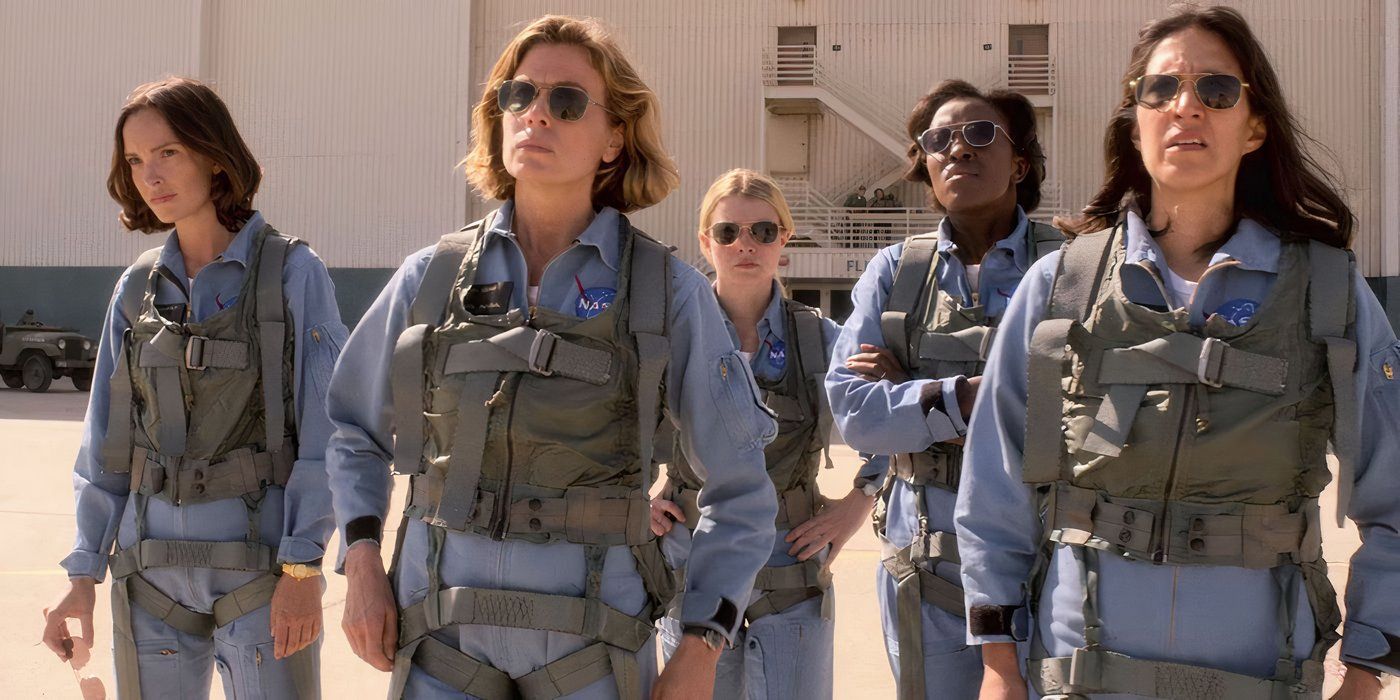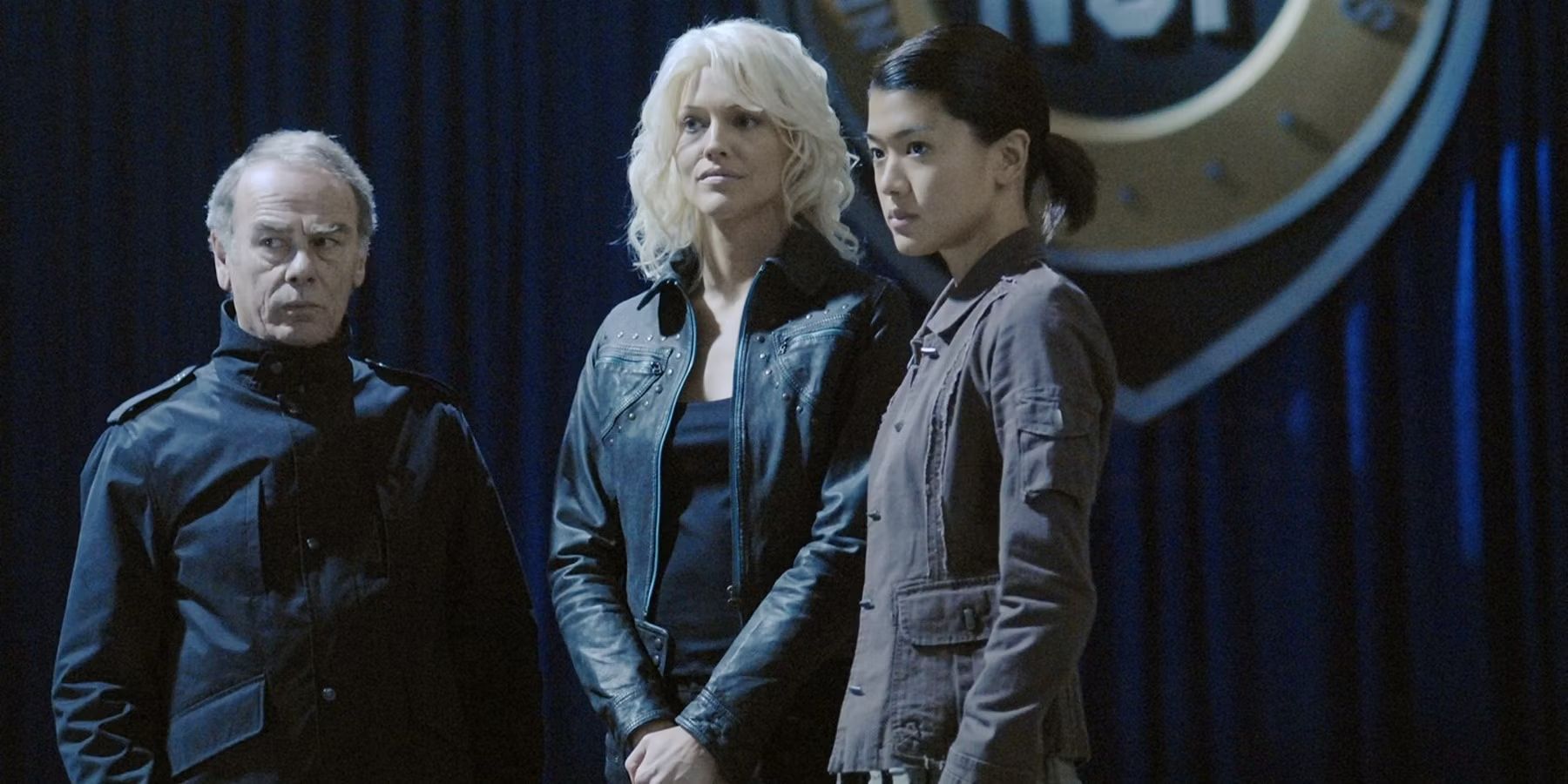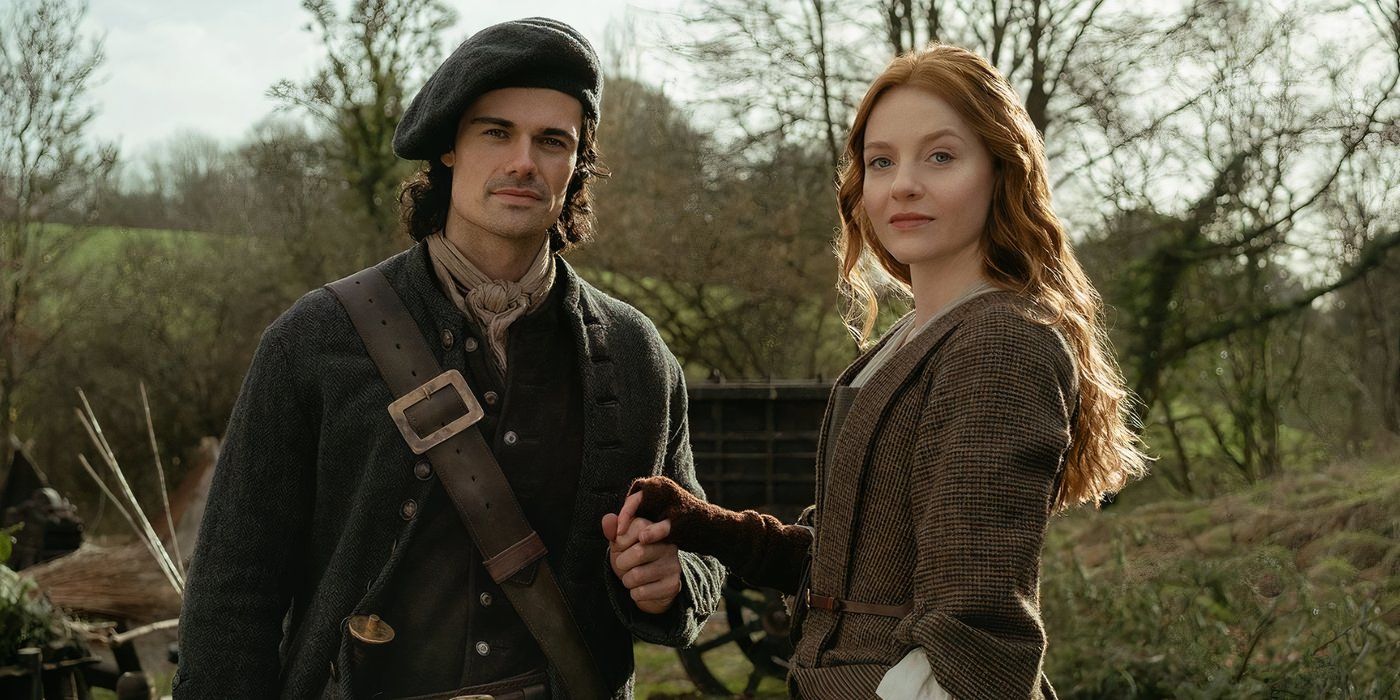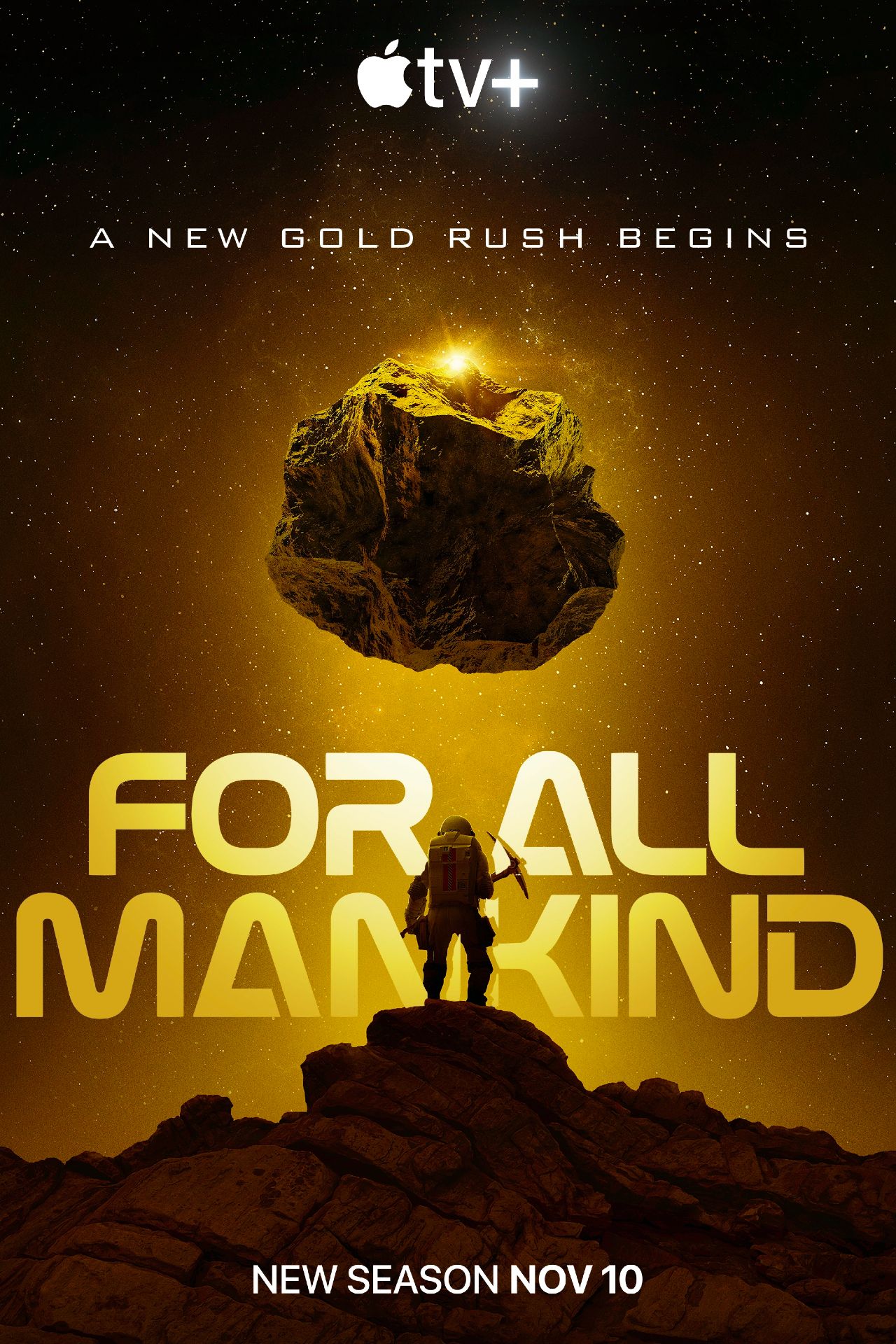Summary
- For All Mankind season 5 brings viewers closer to our present, showcasing a world with a vibrant global space program & Martian base.
- The evolution of characters in For All Mankind is guided by a detailed writer’s guide & biographical sketches, tracking future projections and arcs.
- Producer Ronald D. Moore teases Costa Ronin’s key role in season 5, keeping plot details under wraps to surprise viewers.
The most recent episodes of For All Mankind were released in 2023, and fans have been patiently awaiting news on the fifth season. In April 2024, it was confirmed by Apple TV+ that the space-centered series would be returning to the streaming platform, but many details remained under wraps. Joel Kinnaman, Wrenn Schmidt, Coral Peña, Krys Marshall, Cynthy Wu, Edi Gathegi, Toby Kebbell, Daniel Stern, Tyner Rushing, and Svetlana Efremova all made up the cast of season 4.
While at San Diego Comic-Con, executive producer Ronald D. Moore provided Screen Rant with a much-anticipated update and revealed that Costa Ronin will be playing a “key figure” in the series. He also shared that For All Mankind Season 5 recently began filming, although it does not yet have an official release date. In addition to his work on the Apple TV+ show, Moore has been involved in several well-renowned sci-fi projects such as Battlestar Galactica, Star Trek: The Next Generation, and Roswell.
Related
10 Most Exciting Things To Expect From For All Mankind Season 5
From Ed Baldwin’s last stand to life on Mars, For All Mankind season 4 set up some exciting things to expect from season 5’s 2012 timeline.
Screen Rant interviewed Ronald D. Moore at SDCC in anticipation of his reunion with Battlestar Galactica star Mary McDonnell on his panel. The celebrated creator shared hints about what fans can expect in For All Mankind season 5, reflected on the cultural impact of BSG, and discussed the upcoming Outlander spinoff, Blood of My Blood.
What To Expect From For All Mankind Season 5
Screen Rant: For All Mankind season 5 is going to be closer to our present. How different does that feel from looking at our actual present?
Ronald D. Moore: It’s a very different world because the further that we’ve gotten along this alternate timeline, the changes become bigger and bigger. You’re starting to look at a world that doesn’t look a lot like ours anymore. Physically, yes, their technology has moved ahead quicker than in our timeline, so they’ve gotten to things like flat screens and phones faster than we did. But for the most part, it still looks like a recognizable world except for the fact that there’s a vibrant space program on a global level.
There are many space agencies around the world, there are multiple space stations, and there are thriving new bases and hotels and mining facilities. The Martian base that we established in the last two years has gotten much, much bigger. The Martian base is run by a consortium of powers around the world that are cooperating in space and competing with each other at the same time. So, on that level, it’s very, very different than what we were.
What’s your approach in exploring the present and future down the line now versus the previous four seasons, which rewrote history while still using touchstone events that audiences would recognize?
Ronald D. Moore: The philosophy is still the same, but it gets harder the further along you get for the same reason. What started as a small change in history, once you keep following that path, just branches further and further and further away. It gets harder to make references to political figures that would still function and be relevant in our timeline, but we keep trying to make a way for the audience to have those touchstones because it reminds them of the era.
Just like the music reminds them of the era, and certain historical happenings that we’ve decided would take place no matter what. This sort of ground the show and reminds the audience, “This really is a part of your history.”
Costa Ronin is playing Lenya, a former cosmonaut turned Soviet politician. What can you tease about his character and how he plays into the events of season 5?
Ronald D. Moore: We just started shooting last week, so a lot of the storylines beyond the first episode are still being reworked and rewritten. We try to keep a lot of that as surprises, but he’ll be a key figure on the show.
How For All Mankind Has Evolved Over The Course Of The Last 4 Seasons
I love the musical choices you make every single season. I think it was last season that DMX came on, and I was like, “What? In For All Mankind?” But it hits. Who’s responsible for choosing the music in the show?
Ronald D. Moore: There’s a variety of players, but the two showrunners, Matt Wolpert and Ben Nedivi, are making the final music choices. Matt in particular is very versed in music, and he is a big music lover, but sometimes the directors are popping in with opinions, and some come from the editors. There’s definitely a team approach to how that works.
One of the things I love most about the show is seeing these concepts, proposals, and theoretical possibilities being realized on screen as the result of a never-ending space race. We get the development of things like fusion and power and early adaption to electric vehicles. I’d love to know what you found the most fascinating and took inspiration from when you were building the world.
Ronald D. Moore: The first thing that was really interesting and inspiring was just digging through the plans that NASA had that then didn’t come to fruition. They had a lot of big ideas in the classic Apollo era of what was going to be the follow-up to Apollo. And it was everything from space stations to moon bases to Mars missions to Venus missions, and we were shocked at how much material there was and how many really detailed plans there were.
We had a lot of stuff to sort of draw from. For instance, Sea Dragon, which is the rocket that’s launched in the ocean. That was a real plan. It was an engineer who came up with a whole plan for how that rocket actually would work. It was going to be bigger than the Saturn V and could launch enormous payloads into orbit. When I saw that and saw the diagram in the paper that he drew up about how this thing was going to be launched, I was like, “Oh my God, we have to do that. That’s fantastic.”
There was just so much thought that NASA had already put in, so we had a tremendous amount of material to say, “Okay, let’s do this piece, and let’s do that piece. Let’s run with that.”
Can you share any insight into how the characters in For All Mankind have developed and evolved from season 1? Are they at the place you always wanted them to go, or did you discover that place as you were making the show?
Ronald D. Moore: We had a fairly detailed writer’s guide at the beginning that had biographical sketches of all the main cast and then future projections of where they were going to go, as well as a general arc for the seasons that we follow. We always talked about how, in theory, it was a seven-season show.
I would say that, more or less, we’ve tracked with that. But there were some variations along the way – we certainly didn’t anticipate that Gordo and Tracy were going to die at the end of season 2. It’s an amazing episode, but that was not part of the plan.
That was something that came up organically in the writer’s room, and we shied away from it at first because we loved the cast members and the characters. But it was kind of undeniable. We realized this was the best ending for their story, and it was going to be so perfect in the finale, so we made the change. And we had some future plans for both of those characters – not in any great detail, but we had ideas of what would happen to them down the line. That sort of tracks for all the characters [in] the main cast in season 1. Most of what we talked about, we’ve been able to track.
Ushering Battlestar Galactica Into A New Era
I love Battlestar Galactica, and we’re celebrating its 20th anniversary. The original was introduced to me by my father, but we got closer while watching the more recent version. How does it feel to know that show has had such a cultural impact?
Ronald D. Moore: It’s really gratifying. We went into the show with high hopes. We had very lofty ambitions about reinventing the science fiction space opera, and then we did. At the time it was hard. The budget was pretty tight, and the network wasn’t really that supportive at the very beginning.
There were a lot of battles early on, but we on the show were believers. We just believed in this, and we told each other, “Someday, they’ll love us. Someday they will. They may not be watching us now, or they may not love us yet, but we’re doing something special, and we know it.” And it’s really, really gratifying.
There’s a Battlestar Galactica reboot in development. Did you give any advice to Sam Esmail, especially given the current climate of AI and politics?
Ronald D. Moore: No. I mean, he called me – he gave a courtesy call, which is a lovely gesture. He said, “I’m doing this, and I hope you’re [okay with it].” I was like, “Hey, you don’t have to. You don’t need my permission. But I appreciate the call, it’s very nice. And go with God.”
It’s a tough thing to do these shows in the best of times, and I have no idea really what his plans are or where it’s going.
You reunited with Mary McDonnell over the weekend for Comic-Con. Would you ever like see a scripted reunion special for Battlestar Galactica, and would you want to be the one to tackle it?
Ronald D. Moore: I don’t know. I said goodbye. To me, I wanted [Battlestar Galactica] to have a definitive ending. I felt strongly at the time that I didn’t want to then try to put the gang back together later on, so I destroyed the Galactica, sent this fleet into the sun, landed them on Earth, and said, “This is the end.”
There’s a part of me that wishes I hadn’t done that because how much fun would it be to work with Eddie again? How much fun would it be with Mary and James, Katie and Tricia, and all of them? Now I’m going to forget their names, but I love all of them. There’s a part of me that would have very much enjoyed doing that, but I feel like we said everything we wanted to say and we’ve gone off stage at the right point. I’m happy to leave that desire as our legacy.
Saying Farewell To Outlander & Welcoming Blood Of My Blood
We’re also approaching the end of Outlander with season 8. What do you have in store for Jamie and Claire, especially anything that might surprise the book fans?
Ronald D. Moore: We always try to surprise the book fans. Sometimes the surprise is getting to a place in a different way or delivering a scene in a different moment than they thought, but you’re always trying to satisfy them and surprise them at the same time, so we can’t really say too much about it.
We are in the middle of filming the final season right now, and I can assure the fans that they will have the joy of things that they hope to see, and also the surprise of things they’re expecting.
What can you tease about Outlander: Blood of My Blood and how has it felt to hand off the reigns as showrunner?
Ronald D. Moore: Matt Roberts has run [Outlander] for the past couple of seasons now, and it was great. Matt was there at the very beginning; he was in the writer’s room right from the start, so he’s been on the show and lived and breathed with it for all these years. It was a very comfortable transition to having the full-on showrunner [gig], he’s done an amazing job. He’s probably done a better job than I did.
Matt came up with the idea for the [Blood of My Blood] spinoff, and I thought it was a great one. Everyone agreed, and they put it in production. It’s just a fun notion to go back and see Castle Leoch again; to return to Scotland and get back into that whole Scottish history, which I think a lot of fans miss.
The books and the show leave Scotland and go to the American colonies for a good chunk of time, which is great. It gives us a lot of really interesting story, but there was always something in the blood of the show that was Scottish. You kind of wanted to go back to the Highlands and you wanted to see Colum and Dougal again. Blood of My Blood gives you a chance to sort of revisit all that and tell a story that hadn’t heard yet and see how Jamie’s parents got together. It also tells stories about Claire’s parents in the same show.
About For All Mankind Season 5
Rocketing into the new millennium in the eight years since season three, Happy Valley has rapidly expanded its footprint on Mars by turning former foes into partners. Now 2003, the focus of the space program has turned to the capture and mining of extremely valuable, mineral-rich asteroids that could change the future of both Earth and Mars. But simmering tensions between the residents of the now-sprawling international base threaten to undo everything they are working towards.
Check out our previous For All Mankind interviews here:
For All Mankind is currently available to stream on Apple TV+.
Source: Screen Rant Plus
From San Diego Comic-Con 2024






